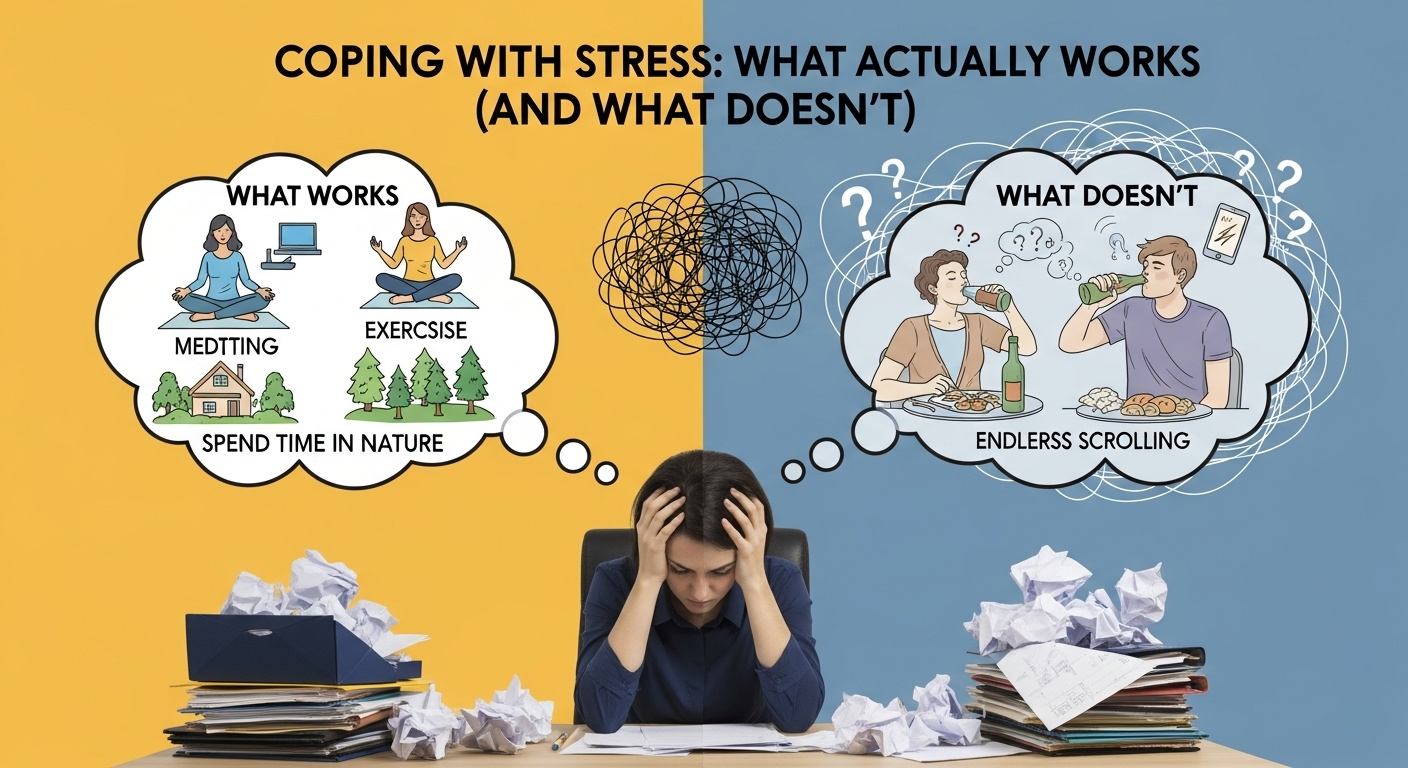Coping with Stress: What Actually Works (and What Doesn’t
Coping with Stress: What Actually Works (and What Doesn’t)
Stress is something we all face, whether it’s from work, relationships, or everyday challenges. But while stress is a natural part of life, how we deal with it makes all the difference. Some coping methods truly help calm your mind and strengthen your resilience — others only make things worse in the long run. Let’s explore what actually works, and what doesn’t, when it comes to coping with stress.
Understanding Stress: Why It Happens
Stress is your body’s response to any demand or threat. When you feel stressed, your body releases hormones like cortisol and adrenaline, preparing you to “fight or flee.” While this response can be useful in emergencies, chronic stress can harm your health, leading to fatigue, anxiety, and even physical illness.
That’s why learning how to manage stress effectively is essential — not just for mental clarity, but for your overall well-being.
What Actually Works for Coping with Stress
1. Mindfulness and Meditation
Practicing mindfulness helps you stay grounded in the present moment. Regular meditation can reduce anxiety, improve focus, and even lower blood pressure. Just 10 minutes a day can make a noticeable difference.
2. Regular Exercise
Physical activity releases endorphins — natural mood boosters that counteract stress hormones. Whether it’s walking, running, yoga, or dancing, movement helps clear your mind and restore balance.
3. Healthy Sleep Habits
Poor sleep increases stress levels, while quality rest helps your brain recover. Aim for 7–9 hours each night, and try to keep a consistent sleep schedule.
4. Social Connection
Talking with friends or family provides emotional support and perspective. Sharing your feelings — even briefly — can make stress feel less overwhelming.
5. Journaling
Writing about your thoughts and emotions helps you process stress instead of bottling it up. Journaling can bring clarity and highlight patterns that trigger anxiety.
6. Deep Breathing and Relaxation Techniques
Simple breathing exercises or progressive muscle relaxation can calm your nervous system and reduce tension almost instantly.
What Doesn’t Work (Even If It Feels Good in the Moment)
1. Avoidance or Denial
Ignoring your problems doesn’t make them go away. In fact, it often makes stress worse over time. Facing your issues head-on is the healthier path.
2. Overeating or Emotional Eating
Food can be comforting, but using it to numb emotions can create a cycle of guilt and poor health — adding more stress in the long term.
3. Excessive Screen Time
Scrolling social media or binge-watching shows might seem like an escape, but it often increases anxiety and reduces real rest.
4. Alcohol or Substance Use
Turning to alcohol or drugs for relief can quickly become destructive. These coping mechanisms might dull stress temporarily but cause more harm later.
5. Overworking Yourself
Some people respond to stress by burying themselves in work. While productivity can distract you, it often leads to burnout and deeper exhaustion.
Finding Your Personal Stress Toolkit
Everyone handles stress differently. The key is to experiment and find what works for you. Maybe meditation helps you reset, or perhaps a walk in nature does the trick. The goal isn’t to eliminate stress entirely but to build habits that help you stay calm, clear-headed, and emotionally balanced when challenges arise.
Final Thoughts
Coping with stress effectively isn’t about quick fixes — it’s about self-awareness and consistency. Focus on healthy strategies that nurture your mind and body, and be patient with yourself in the process. Over time, you’ll discover that managing stress is less about control and more about care — for yourself and your well-being.

